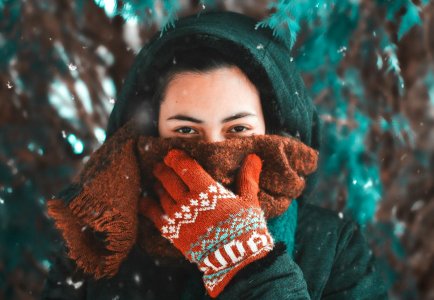Why winter makes you more prone to sickness—here’s the overlooked truth
By
Aubrey Razon
- Replies 0
Disclaimer: The information provided in this article is for educational purposes only and is not intended as a substitute for professional medical advice, diagnosis, or treatment. Always consult your physician or other qualified healthcare providers with any questions you may have regarding a medical condition or before making any changes to your health regimen.
As winter chills set in, you’ve probably heard the advice to "bundle up or you'll catch a cold!" It turns out, there’s more truth to this than you might think.
Before dismissing it, discover why you’re more likely to get sick during the colder months.
It's a scene as old as time: winter arrives, and with it, the season of coughs, colds, and flu seems to open its doors.
But does cold weather itself usher in these unwelcome guests, or is there more to the story?
Dr. Winston Rajendram, a family medicine physician, confirms that cold weather can indeed weaken our immune defenses.
The chilly, dry air of winter creates a haven for respiratory viruses to thrive.
Viruses are like uninvited guests that need a warm body to call home.
When someone with a cold or flu sneezes or coughs, they release droplets teeming with viruses into the air.
In cooler, drier conditions, these droplets can hang around longer, increasing the chances of someone else breathing them in.
Andrew Pekosz, a professor of molecular biology and immunology, explains that in higher temperatures and humidity, viruses are less likely to stay airborne, as they cling to water molecules and drop out of the air.
As the temperature drops, we tend to seek the warmth of the indoors, often in close quarters with others.
This shift in behavior during the winter months means we're more likely to be sharing space with someone who's already sick.
Poor ventilation indoors can mean that viruses circulate in the air longer, leading to higher chances of transmission.
While there's no armor that can make us invincible to viruses, dressing warmly with hats and gloves can help keep our bodies at a stable temperature, potentially aiding our immune system in fending off invaders.
And let's not forget the power of the mask—a simple barrier that can help prevent the spread of germs—whether you're the one feeling under the weather or you're trying to protect yourself from others who are.
Dr. Rajendram emphasizes the importance of consulting your physician about vaccines, which play a key role in protecting against the flu and COVID-19.
With hundreds of thousands of hospitalizations and deaths attributed to these illnesses, vaccines can significantly reduce the risk of serious infection.
And while there's no vaccine for the common cold, taking preventive measures like getting vaccinated for other respiratory viruses can help keep your immune system strong.
In addition to modern medicine's advice, there are timeless tips that can help keep you healthy:
By combining this time-tested advice with modern scientific understanding and preventive measures, you can strengthen your defenses against the seasonal surge of sniffles.
So wrap up, stay vigilant, and let's show those winter bugs that we're not an easy target!

What steps do you take to maintain your health during the winter months? How do you stay informed about health advisories related to seasonal illnesses? Share your tips and advice in the comments below.
As winter chills set in, you’ve probably heard the advice to "bundle up or you'll catch a cold!" It turns out, there’s more truth to this than you might think.
Before dismissing it, discover why you’re more likely to get sick during the colder months.
It's a scene as old as time: winter arrives, and with it, the season of coughs, colds, and flu seems to open its doors.
But does cold weather itself usher in these unwelcome guests, or is there more to the story?
Dr. Winston Rajendram, a family medicine physician, confirms that cold weather can indeed weaken our immune defenses.
The chilly, dry air of winter creates a haven for respiratory viruses to thrive.
Viruses are like uninvited guests that need a warm body to call home.
When someone with a cold or flu sneezes or coughs, they release droplets teeming with viruses into the air.
In cooler, drier conditions, these droplets can hang around longer, increasing the chances of someone else breathing them in.
Andrew Pekosz, a professor of molecular biology and immunology, explains that in higher temperatures and humidity, viruses are less likely to stay airborne, as they cling to water molecules and drop out of the air.
As the temperature drops, we tend to seek the warmth of the indoors, often in close quarters with others.
This shift in behavior during the winter months means we're more likely to be sharing space with someone who's already sick.
Poor ventilation indoors can mean that viruses circulate in the air longer, leading to higher chances of transmission.
While there's no armor that can make us invincible to viruses, dressing warmly with hats and gloves can help keep our bodies at a stable temperature, potentially aiding our immune system in fending off invaders.
And let's not forget the power of the mask—a simple barrier that can help prevent the spread of germs—whether you're the one feeling under the weather or you're trying to protect yourself from others who are.
Dr. Rajendram emphasizes the importance of consulting your physician about vaccines, which play a key role in protecting against the flu and COVID-19.
With hundreds of thousands of hospitalizations and deaths attributed to these illnesses, vaccines can significantly reduce the risk of serious infection.
And while there's no vaccine for the common cold, taking preventive measures like getting vaccinated for other respiratory viruses can help keep your immune system strong.
In addition to modern medicine's advice, there are timeless tips that can help keep you healthy:
- Stay warm and dry: Dress in layers and keep extremities protected from the cold.
- Practice good hygiene: Wash your hands frequently, avoid touching your face, and cover coughs and sneezes properly.
- Stay home if you're sick: Reduce the risk of spreading illness by resting and recovering at home.
- Keep your environment clean: Regularly disinfect commonly touched surfaces to minimize the presence of viruses.
By combining this time-tested advice with modern scientific understanding and preventive measures, you can strengthen your defenses against the seasonal surge of sniffles.
So wrap up, stay vigilant, and let's show those winter bugs that we're not an easy target!
Key Takeaways
- Exposure to cold weather itself won't directly cause a common cold, but it can weaken the immune system and create an environment where respiratory viruses thrive.
- Viruses like those causing the common cold, flu, and COVID-19 can remain airborne longer in cooler, drier air conditions, increasing infection chances.
- Spending more time indoors during colder months, often in close proximity to others, contributes to the spread of these viruses.
- To reduce the risk of infection, it is recommended to get vaccinated, dress appropriately for the cold, practice good hygiene, and wear a mask when necessary.







